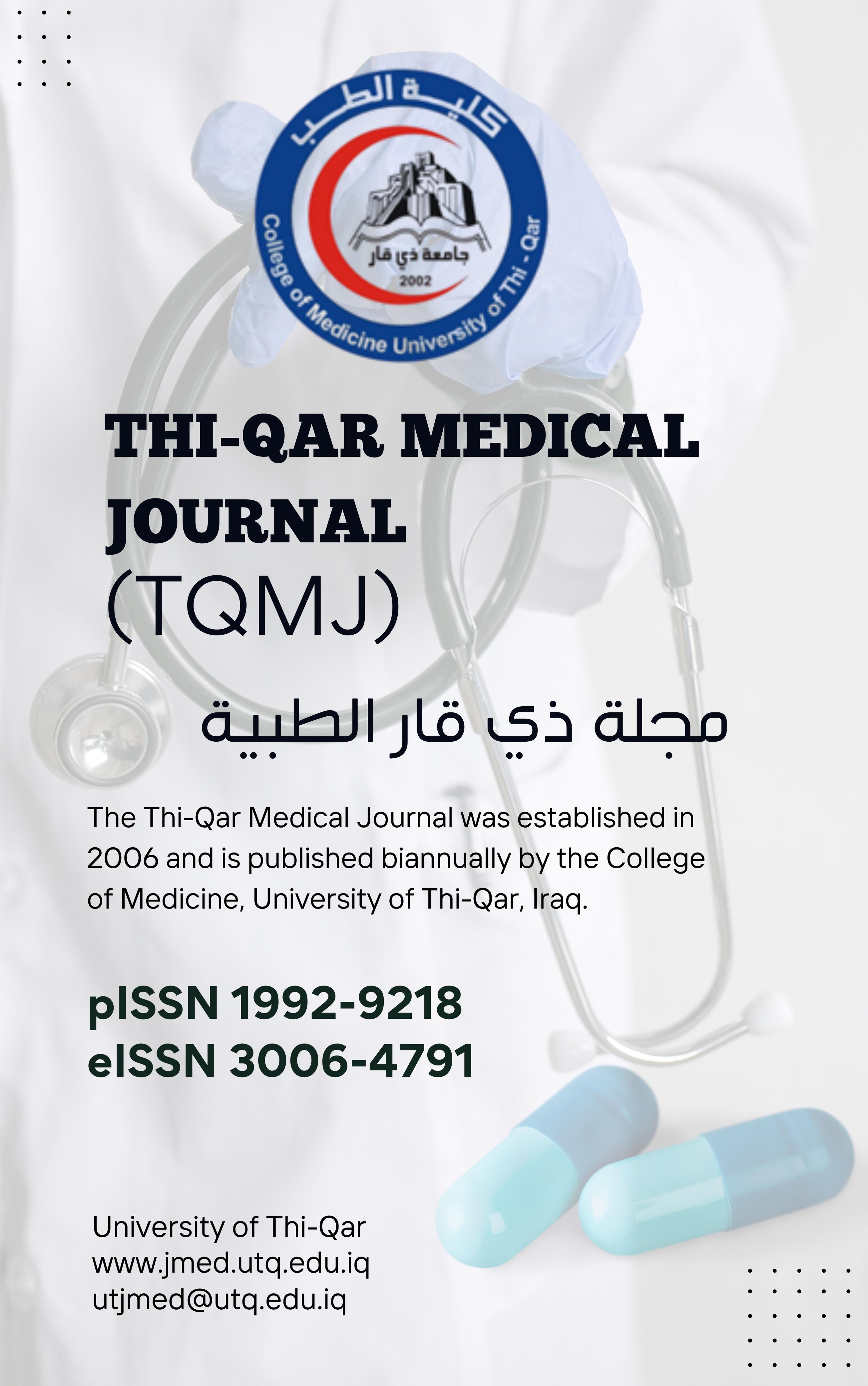ANTITHYROID ANTIBODIES AND INFERTILITY IN WOMEN
DOI:
https://doi.org/10.32792/tmj.v6i1.207Abstract
Background: Fecundity followed by pregnancy is the fundamental process to sustain life and require a close interplay between normally functioning and adapting endocrine and immune system (1). Pregnancy represents one of the most significant areas of study for the immunobiologist (2), the reasons for the success of gestation in both normal and abnormal pregnancies remain unclear because of the antigenically dissimilarity between the fetus and the mother (3). Patients and methods: This study included 180 females who were selectively collected and were suffering from infertility and 70 healthy fertile females as control group, that attending Al-Zahraa Teaching Maternity and Pediatrics hospital, and Al-Sader Teaching hospitals in Al-Najaf Al-Ashraf Governorate from November 2007 to June 2008. All the females were in their fertile age. Results: The range of the women's age was between 18 years and 41 years with mean age of 27.1 years. In spite of the only slightly increased incidence of antithyroglobulin antibodies in the group of primary unexplained infertility (12.5%), there is significant raise in secondary unexplained infertile women (26.67%) compared to the fertile group (8.57%) as shown in table 3.16. Our results, however, show a highly significant correlation (P < 0.005) statistically. Conclusions and recommendations: There was a significant correlation between women who are suffering from infertility and the presence of antithyroglobulin antibody in their serum whether they were suffering from thyroid diseases or not. So it is recommended to do an autoantibody survey particularly antithyroid antibody for females who are suffering from infertility specially those of unexplained type or those with failed therapy of unknown cause.References
Poppe, K. (2007). Thyroid disease and female reproduction. Clin Endocrinol; 66: 309–321.
Hacker, N.; and Moore, J. (1992). Essentials of obstetrics and gynecology, 2nd ed.;90-101.
Roitt, I.; Brostoff, J.; and Male, D. (2001) Immunology, 6th ed. Mosby; 451.
Agarwal, A.; and Saleh, RA. (2004). Role of free radicals in female reproductive diseases and assisted reproduction. Reproduction biomedicine online, www.rbmonline.com, RBM online; 9, No.3, 338-347.
WHO (1999). Laboratory manual for the examination of human semen and semen cervical mucous interaction.
Goldman, L.; and Ausiello, D. (2008). Women health. Cecil medicine, 8th ed. Saunders co.; 1026- 1160.
Gandhi, M. (2004). Immunology. Blueprints microbiology and immunology.; 161-187, 6th ed.
Dorinda, A. (1999). Introduction to immunology and autoimmunity. Environmental health perspectives; 107(S5):1-2.
Meroni, PL.; Borghi, MO.; Raschi, E., Ventura, D.; Sarzi Puttini, PC.; Atzeni, F.; Parati, G.; Tincani, A.; Mari, D.; Tedesco, F. (2004). Inflammatory response and endothelium. Thrombosis Research,; 114(329-34).
Rose, NR. (1998). Autoimmune disease in women – the facts. American autoimmune related disease association; 602:451.
Kutteh, W.; Schoolcraft, W.; and Scott, R. Jr. (1999).Antithyroid Antibodies Do Not Affect Pregnancy Outcome in Women Undergoing Assisted Reproduction Hum Reprod.;14:2886-2890
Vaquero, E. (2000). Mild thyroid abnormalities and recurrent spontaneous abortion: diagnostic and therapeutical approach. Am J Reprod Immunol.;43(4):204-8.
Matalon, S.; Blank, M.; Ornoy, A.; Shoenfeld, Y. (2001). The Association Between Anti-Thyroid Antibodies and Pregnancy Loss. American Journal of Reproductive Immunology.; 45, 72.
Kutteh, WH. (1999). Increased prevalence of antithyroid antibodies identified in women with recurrent pregnancy loss but not in women undergoing assisted reproduction. Fertil Steril.; 71: 843–848.
Daniel, W. (2005). Biostatistics: A foundation for analysis in the health sciences.8th ed. Wiley and sons, INC.
Healy, DL. et al., (1994). Female infertility: causes and treatment. Lancet; 343: 1539–1544
Jin-Chun, Lu.; Yu-Feng, H.; and Nian-Qing, Lu. (2008). Antisperm Immunity and Infertility. Expert Rev Clin Immunol.; 4(1):113-126.
Hollowell, JG. (2002). Serum TSH, T4, and thyroid antibodies in the United States population (1988 to 1994): National Health and Nutrition Examination Survey (NHANES III). J Clin Endocrinol Metab; 87: 489–499.
Van Voorhis, BJ.; and Stovall, DW. (1997). Autoantibodies and infertility: a review of the literature. J Reprod Immunol.; 33:239-56.
Wilson, C. (1975). Smooth-muscle antibodies in infertility. Lancet; 20: 1238–1239
Rousseve, RG.; and Nick, A. (1996). Laboratory evaluation of women experiencing reproductive failure. Am J Reprod Immunol; 35: 415-420.
Petta, CA. (2007). Thyroid autoimmunity and thyroid dysfunction in women with endometriosis. Hum Reprod .; 22: 2693–2697
Reimand, K.; Doll, J. (2001). Autoantibody studies of female patients with reproductive failure. J Reprod Immunol; 51: 167–176
Poppe, K. (2002). Thyroid dysfunction and autoimmunity in infertile women. Thyroid; 12: 997–1001
Janssen, OE. (2004). High prevalence of autoimmune thyroiditis in patients with polycystic ovary syndrome. Eur J Endocrinol; 150: 363–369.
Kaider, AS.; Kaider, BD.; Janowicz, PB.; and Roussev RG. (1999). Immunodiagnostic evaluation in women with reproductive failure. Am J Reprod Immunol.;42:335-346.
Abalovich, M. (2007). Subclinical hypothyroidism and thyroid autoimmunity in women with infertility. Gynecol Endocrinol; 23: 279–283.
Tomer, Y.; and Davies, TF. (2003). Searching for the autoimmune thyroid disease susceptibility genes: from gene mapping to gene function. Endo Rev; 24: 694–717.
Prummel, MF.; Saddler K. (2004). The environment and autoimmune thyroid diseases. Eur J Endocrinol; 150: 605–618.




